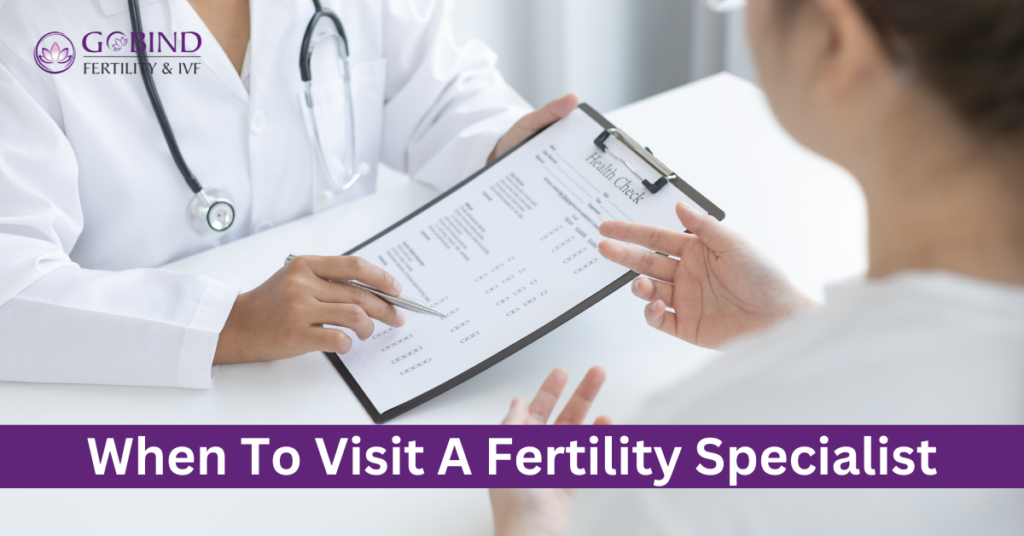A Comprehensive Guide on When to Visit a Fertility Specialist

Navigating the journey to parenthood can be a deeply personal and sometimes challenging experience. The path to conception is straightforward for many couples, but for others, it may require professional assistance. Knowing when to visit a fertility specialist is crucial for optimizing your chances of achieving a successful pregnancy. This article guides on the right time to consult a fertility specialist and what to expect from the process.
Understanding Fertility Timelines
Before delving into when to visit a fertility specialist, it’s important to understand what is considered normal when trying to conceive.
- General Timeline: For most couples, the average time to conceive is within 6 to 12 months of regular, unprotected intercourse. This timeframe may vary based on age and health factors.
- Age Considerations: Fertility naturally declines with age, especially for women. Women over 35 are advised to seek professional advice after 6 months of trying, while women under 35 can generally wait up to 12 months before consulting a specialist.
Signs- It’s Time to See a Fertility Specialist
Several indicators suggest it may be time to consult a fertility specialist.
Here’s a breakdown of key signs:
- For Women: If you’re under 35 and haven’t conceived after a year of regular, unprotected sex, it’s a good idea to seek help. For those over 35, consider seeing a specialist after 6 months.
- For Men: If there are concerns about sperm quality, such as low libido or issues with ejaculation, a fertility specialist can provide an evaluation.
Irregular Menstrual Cycles:
- Women with irregular or absent menstrual cycles may have underlying conditions such as polycystic ovary syndrome (PCOS) or thyroid issues, which can affect fertility. A fertility specialist can help diagnose and treat these conditions.
History of Miscarriages:
- Experiencing recurrent miscarriages (typically defined as three or more) warrants a consultation with a fertility specialist. They can perform tests to identify potential causes and recommend treatments to improve the chances of a successful pregnancy.
Known Medical Conditions:
- Conditions like endometriosis, uterine fibroids, or chronic illnesses such as diabetes can impact fertility. Consulting a specialist can help manage these conditions in the context of conception.
Advanced Age:
- Women over 40 or men with concerns about age-related fertility decline should seek early consultation with a specialist. Fertility treatments and interventions may be more effective with early planning.
Genetic or Hormonal Concerns:
- If you or your partner have known genetic conditions or hormonal imbalances, a fertility specialist can offer testing and treatment options to address these issues.
Failed Previous Treatments:
- If you’ve undergone previous unsuccessful fertility treatments, it might be time to consult a specialist for a second opinion or to explore advanced treatment options.
What to Expect During Your Visit
When you decide to see a fertility specialist, here’s what you can expect:
Initial Consultation:
- The first visit typically involves a thorough review of your medical history, lifestyle factors, and fertility concerns. Both partners may be asked to provide information to identify any potential issues.
Diagnostic Testing:
- The specialist may recommend a series of tests to evaluate fertility. This might include blood tests, hormone level assessments, ultrasound scans, semen analysis for men, and possibly more specialized tests depending on individual circumstances.
Treatment Options:
- Based on the results, the specialist will discuss possible treatment options. These may range from lifestyle changes and medication to more advanced interventions such as in vitro fertilization (IVF) or intrauterine insemination (IUI).
Personalized Plan:
- A fertility specialist will work with you to create a personalized treatment plan that aligns with your goals, health, and circumstances. They will also provide guidance on the next steps and what to expect throughout the process.
Emotional Support:
- Navigating fertility issues can be emotionally challenging. Many fertility clinics offer counselling and support services to help individuals and couples cope with the stress and emotional aspects of the journey.
Deciding to visit a fertility specialist is a significant step, and knowing when to seek help can make a difference in your journey to parenthood. If you find yourself facing prolonged difficulties in conceiving, experiencing reproductive health issues, or have concerns about your fertility, Dr. Manju Khurana (Senior IVF Specialist ) at Gobind Fertility & IVF Center in Hisar can provide valuable insights and treatment options.
Remember, seeking professional help early can often lead to better outcomes and provide you with the support and resources needed to achieve your fertility goals.
..
